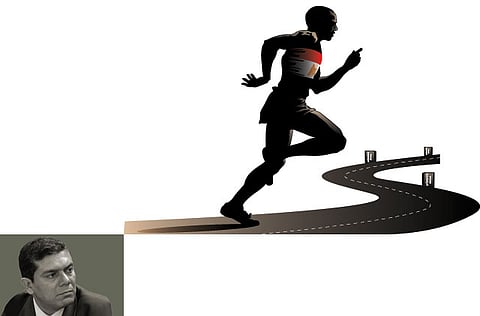Collusion tests people’s resolve
Leaders of secular parties believe the Muslim Brotherhood and the military are working in tandem to hijack the revolution in the coming elections

The road to Egypt's parliamentary elections is proving to be a treacherous one, fraught with challenges ranging from rising public dismay at the ruling Supreme Council of the Armed Forces (SCAF) to fear of a sweeping Islamist takeover that many on the left see as undermining the objectives of the January's uprising that toppled president Hosni Mubarak and ended his three-decade rule.
On July 8, hundreds of thousands of Egyptians poured into Tahrir Square in the heart of Cairo, the symbol of the Egyptian revolution and a source of inspiration for millions of Arabs protesting against their rulers in Yemen, Syria and elsewhere. "Revolution First" was the rallying call for protesters who gathered in the square to send a strong message to their interim government and the ruling military. They wanted to save their revolution from what they believe are conspiracies to derail it and pave the way for the old regime's henchmen to regain control of the country.
The Muslim Brotherhood, who remain the most organised and influential political movement in the street, reluctantly joined Friday's protest, but not before claiming that without them half of the demonstrators would not have shown up. It was a test of resolve and a harbinger of what could come next: a possible showdown between them and the rest of the popular movements now active in the Egyptian political scene. The April 6 Youth Movement and leaders of secular parties believe the Muslim Brotherhood and the military are colluding to hijack the revolution in the coming elections when parties and candidates contest the 500 seat parliament.
The Muslim Brotherhood joined the youth barricading Tahrir Square in the final days of the revolt. Now there is a growing feeling among secular youth and leftist parties that the Islamists are on their way to reap the fruits of the revolution while sticking to their religious mandate. Hundreds of thousands of Salafis and fundamentalist Muslims are also proving to be as influential among voters.
Observers believe the Brotherhood's newly founded Justice and Freedom Party will take no less than 25 per cent of the seats in the elections. Others think they will do much better. The movement, which has been banned and its members hunted down under Mubarak's regime, has won an important battle against secular parties; to hold elections before adopting a new constitution. Secular parties, who under Mubarak were allowed only symbolic representation in parliament, if any, are calling on the military to delay the elections to give them more time to organise themselves. On Wednesday, bowing to increased public pressure, the military announced that the elections will be postponed from one to three months.
Meanwhile, the Egyptian street is growing increasingly frustrated. The economy remains weak, unemployment rates are high, inflation is making life difficult for ordinary citizens and a state of lawlessness remains widespread across the country. There is anger at the government and the military for what is seen as delayed justice being carried out against the former president, his sons and key figures in the old regime. In recent weeks, policemen accused of killing protesters during the revolution have either been acquitted or had their trials postponed. Former ministers accused of corruption have also been set free. But in the biggest purge of its kind yet, the Ministry of Interior fired last week 600 policemen, including senior officers, who were believed to be associated with deadly attacks against protesters earlier this year.
The military council is now feeling the pressure and is promising to take a number of transparent and concrete steps to appease the street. Whether such steps will defuse the current crisis remains to be seen. But concessions by the military only underline growing public suspicions.
Egypt's top military had benefited from the Mubarak era. All of the previous governors were retired generals and many had huge business interests under the former regime. They stand to lose a lot if a civilian, democratic and transparent system emerges in Egypt by the end of the year.
Power-sharing deal
Mubarak and his clique relied entirely on the military, a product of the 1952 coup which ended the monarchy. While Mubarak was deposed, the military establishment to which he handed over power remains in charge. This is why Egypt's rebellious young and small secular parties now believe the army will never relinquish control, peacefully.
On the other hand the Muslim Brotherhood and other Islamists see the elections as a golden opportunity to fulfil decades-old objective of becoming an indispensable element in a power-sharing deal. Old party hands remember the days when the Free Officers allied themselves with the Brotherhood to overthrow the monarchy. Jamal Abdul Nasser, after seizing power, later turned against them, killing and imprisoning their leaders.
History could be repeating itself here. The Brotherhood, which is witnessing a power struggle between old and young leaders, is likely to have reached an understanding with the army to reap political gains in the upcoming elections in a deal that also gives the ruling military council a say in Egypt's future.
It's not the rosy picture that Egyptians, and Arabs, are hoping to see. Mubarak has fallen but the most important foundation of his long reign, the military, remains intact. Many Egyptians are realising this only now. This is one reason why SCAF is dragging its feet in conducting trials of Mubarak, his sons and other key figures of the defunct regime. This is also a main cause for rising public discontent.
Egypt is now facing a fork in the road: A sequel to the revolution could very well be in the cards; one that targets the military council above all. Or parties could wait for the elections and watch its political repercussions.
Osama Al Sharif is a political commentator based in Amman.



